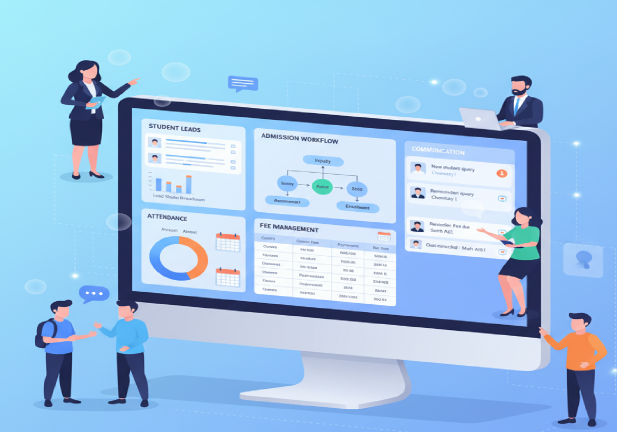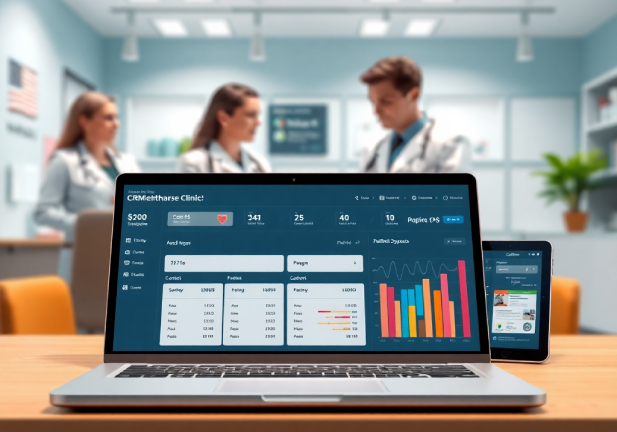Introduction - Healthcare CRM Software Development
In the fast-evolving world of healthcare, managing patient data, appointments, communication, and billing efficiently is more important than ever. Traditional methods or outdated systems often create confusion, delays, and human errors that affect both patient satisfaction and overall operational efficiency. This is where a CRM Software Development Company for Healthcare plays a crucial role.
A well-designed Healthcare CRM Software helps clinics, hospitals, and diagnostic centers streamline operations, enhance communication between staff and patients, and provide a personalized healthcare experience. Whether it’s managing patient records, sending automated appointment reminders, or analyzing service performance, a custom CRM system simplifies everything in one centralized platform.
However, choosing the right CRM development company is not an easy task. Healthcare organizations need a trusted technology partner who understands medical workflows, compliance requirements (like HIPAA or GDPR), and patient privacy. The right partner not only builds software but also ensures seamless integration with your existing tools and future scalability.
In this blog, we’ll explore why healthcare businesses need CRM, its key features, major benefits, and — most importantly — how to choose the best CRM Software Development Company for Healthcare that truly understands your clinical and operational needs.
Why Healthcare Businesses Need a Custom CRM Solution
Healthcare is one of the most data-driven industries in the world. Every patient interaction generates information—appointments, prescriptions, lab reports, billing records, and follow-up details. Without an organized system, this massive amount of data can quickly become chaotic. That’s where a Custom CRM Software for Healthcare makes a real difference. It provides hospitals, clinics, and diagnostic centers with a unified platform to manage all their operations efficiently and securely.
Unlike generic CRM systems, a Healthcare CRM Development Company designs software specifically to fit the workflows of medical organizations. From patient onboarding to aftercare communication, everything is automated and tracked. Below are the key reasons why healthcare businesses must invest in a custom CRM solution.
1. Inefficient Patient Data Management
One of the most common problems in healthcare management is data fragmentation. Patient information is often stored in multiple systems—some in Excel sheets, some on hospital servers, and some on paper records. This not only makes retrieval time-consuming but also increases the risk of errors and data loss.
A Healthcare CRM Software centralizes all patient information in one secure location. Doctors, nurses, and administrative staff can access the data instantly from any device, ensuring accuracy and consistency. The CRM system can store complete patient histories, prescriptions, and diagnostic details, helping practitioners deliver faster and more informed care.
By partnering with a CRM Software Development Company for Healthcare, organizations can ensure that their CRM integrates smoothly with existing hospital systems such as EHR (Electronic Health Records) and billing tools.
2. Missed Appointments and Poor Follow-Ups
Missed appointments and follow-ups not only reduce revenue but also affect patient satisfaction. In traditional systems, reminders are manually managed, which leads to frequent errors. A custom Clinic CRM Software solves this issue through automation.
The CRM automatically sends appointment reminders via SMS, email, or WhatsApp. It also alerts staff for follow-up visits, test results, or pending bills. This level of automation enhances communication, keeps the patient engaged, and reduces no-shows significantly.
With features like scheduling dashboards and AI-based notifications, healthcare professionals can focus more on treatment and less on administrative tasks.
3. Lack of Patient Engagement
Today’s patients expect personalized communication and seamless service from healthcare providers. Unfortunately, most clinics lack a proper system to engage patients after treatment. A Custom Healthcare CRM helps bridge this communication gap.
It allows you to send personalized health tips, check-up reminders, and satisfaction surveys automatically. Clinics can segment their patients based on demographics, past visits, or medical conditions to deliver tailored communication. This not only builds trust but also encourages patient loyalty, turning one-time visitors into long-term clients.
In short, CRM Solutions for Hospitals enhance the patient experience and strengthen the relationship between healthcare providers and their patients.
4. No Analytics or Insights
Without data analytics, healthcare businesses operate blindly. They have little idea about their service performance, patient retention rates, or the effectiveness of marketing efforts. A Healthcare CRM Software solves this by offering real-time dashboards and analytics tools.
Administrators can easily track patient inflow, revenue trends, staff performance, and referral sources. Predictive analytics can even forecast patient demand based on seasonality or medical conditions.
Such insights empower management to make data-driven decisions that improve efficiency, reduce costs, and enhance overall service delivery.
Key Features of Healthcare CRM Software
A well-built Healthcare CRM Software is not just a database — it’s an intelligent system that connects doctors, patients, and staff through a single platform. When developed by a professional CRM Software Development Company for Healthcare, the software becomes the backbone of the hospital or clinic’s digital operations.
Here are the key features that every custom CRM for healthcare and clinics should include:
1. Patient Management System
A healthcare CRM acts as a centralized hub for all patient-related data — including demographics, medical history, prescriptions, allergies, test results, and billing information.
This allows doctors and staff to access records instantly and ensures better diagnosis and treatment decisions.
For multi-specialty hospitals, the Patient Management CRM Software can also categorize patients by departments, such as orthopedics, cardiology, or pediatrics, for better organization.
With this feature, clinics can eliminate paperwork and minimize data errors while ensuring that patient information is secure and easily retrievable.
2. Appointment Scheduling and Automation
Appointment management is one of the most important modules in any healthcare CRM. It helps clinics and hospitals schedule, reschedule, and cancel appointments without confusion.
Automated reminders through SMS, email, or WhatsApp drastically reduce no-shows and missed follow-ups.
A CRM Software Development Company for Clinics can also integrate online booking systems into websites or mobile apps, allowing patients to book appointments directly.
This creates a seamless patient journey — from scheduling to treatment to follow-up.
3. Multi-Channel Communication System
Effective communication is key to a positive patient experience. A Healthcare CRM Software allows healthcare providers to interact with patients via multiple channels — such as phone calls, emails, chatbots, and even WhatsApp messages.
All communication logs are stored within the CRM, ensuring that every interaction is traceable and recorded.
This not only improves transparency but also makes patient support faster and more consistent.
For example, automated thank-you messages after appointments or feedback surveys help strengthen long-term relationships.
4. Analytics and Performance Dashboard
A CRM is incomplete without a powerful analytics system. The Healthcare CRM Development Company can design dashboards that track the most important KPIs — such as patient inflow, appointment trends, staff efficiency, billing performance, and service quality metrics.
This data-driven approach helps management identify bottlenecks and make informed decisions. Predictive analytics can even forecast future patient demand or staff needs based on historical trends, helping hospitals plan resources more effectively.
5. Billing and Payment Management
Handling billing in healthcare is complex — different services, doctors, and insurance types. A Custom CRM for Healthcare simplifies the process by integrating billing modules that automatically generate invoices, manage payments, and track outstanding balances.
This system also supports integration with accounting tools like QuickBooks or hospital ERP software, ensuring financial accuracy and transparency.
6. Data Security and Compliance Management
In the healthcare industry, data privacy isn’t optional — it’s mandatory. A professional Healthcare CRM Development Company builds systems that comply with HIPAA, GDPR, and other healthcare data protection standards.
The CRM uses secure logins, data encryption, and role-based access to ensure that only authorized personnel can view sensitive patient information.
This not only ensures legal compliance but also builds trust among patients who expect confidentiality.
7. Integration with Third-Party Systems
A good Healthcare CRM Software should seamlessly integrate with other medical systems such as EMR (Electronic Medical Records), Telemedicine tools, pharmacy management, and insurance portals.
Integration eliminates manual data entry and ensures all departments work in sync — from doctors and lab technicians to administrative staff.
This interconnected environment improves accuracy, reduces workload, and enhances the overall efficiency of the healthcare facility.
Benefits of Implementing a Healthcare CRM
A Healthcare CRM Software offers a wide range of benefits that go beyond basic data management. When developed by an experienced CRM Software Development Company for Healthcare, it can completely transform how hospitals, clinics, and healthcare networks operate. Let’s look at the most impactful benefits below.
1. Centralized Patient Information
A major advantage of implementing a CRM is that it centralizes all patient-related data in one place. Doctors, nurses, and administrative teams can instantly access updated records — from medical history and test results to insurance details.
This reduces duplicate entries and eliminates delays caused by missing information. Ultimately, it enhances coordination among departments and ensures better care delivery.
2. Improved Appointment Management
Healthcare CRM automates the entire appointment process — from booking and reminders to follow-ups. Automated notifications via SMS or email reduce no-shows, allowing staff to manage time efficiently.
This not only increases patient satisfaction but also optimizes doctors’ schedules, ensuring a smooth daily workflow.
3. Enhanced Patient Engagement
Engaged patients are more likely to trust and return to the same healthcare provider. A Healthcare CRM Development Company can build personalized communication tools that send health reminders, check-up alerts, or post-treatment care messages.
This consistent engagement improves relationships, builds trust, and encourages long-term loyalty.
4. Better Decision-Making with Analytics
Healthcare CRM systems include detailed dashboards and analytics to track patient inflow, satisfaction scores, and service efficiency.
By analyzing this data, healthcare organizations can identify trends, understand bottlenecks, and make data-backed decisions that improve performance.
For management teams, these insights are crucial for strategic planning and revenue optimization.
5. Increased Revenue and Operational Efficiency
By automating repetitive tasks and improving communication, CRM systems reduce administrative workload and human errors.
Clinics can serve more patients in less time, manage billing accurately, and track unpaid invoices — all leading to improved cash flow.
A Custom CRM for Healthcare and Clinics ensures that every process — from patient onboarding to billing — is streamlined and cost-effective.
6. Data Security and Compliance
Data privacy is one of the biggest concerns in the medical field. A professionally developed Healthcare CRM Software ensures compliance with HIPAA, GDPR, and other healthcare data regulations.
Encrypted communication, secure logins, and user-level access control protect sensitive medical information and build trust among patients.
With these benefits, it’s clear that a CRM Software Development Company for Healthcare doesn’t just deliver software — it delivers an ecosystem that drives efficiency, transparency, and patient satisfaction.
How Corewave Develops Healthcare CRM Software
Developing a custom Healthcare CRM Software requires more than just coding — it demands a deep understanding of healthcare operations, patient needs, and compliance standards. As a leading CRM Software Development Company for Healthcare, Corewave follows a structured, transparent, and quality-driven process to ensure every CRM solution meets your clinical and business goals.
Here’s a step-by-step breakdown of how Corewave builds powerful CRM systems for hospitals, clinics, and healthcare enterprises:
Step 1 – Requirement Analysis
The first and most crucial stage in CRM development is understanding your specific needs. Corewave’s team conducts detailed discussions with hospital administrators, doctors, and support staff to understand their workflow, data management challenges, and communication gaps.
During this phase, the focus is on identifying pain points such as missed follow-ups, poor patient data organization, or slow appointment processes.
Our goal is to create a custom CRM development roadmap that aligns perfectly with your clinic’s operations and long-term goals.
Step 2 – UI/UX Design
Once the requirements are finalized, our design experts create an intuitive and user-friendly interface. The healthcare industry involves users with varied technical expertise — from doctors and nurses to receptionists and lab staff.
Therefore, Corewave’s design team focuses on simplicity, easy navigation, and mobile responsiveness.
We ensure that each feature — from patient lookup to billing — is accessible with just a few clicks. The result is a CRM dashboard that’s not only functional but also visually appealing and effortless to use.
Step 3 – Custom Module Development
Every clinic and hospital has unique operational requirements. Corewave develops custom modules for appointment scheduling, patient communication, billing, inventory management, and more — depending on the client’s needs.
We use secure and scalable technologies to ensure that your CRM system can grow with your organization.
The modules are designed to automate daily tasks, reduce manual errors, and provide real-time visibility across departments.
Step 4 – Integration & Testing
A successful Healthcare CRM Software must integrate seamlessly with existing tools such as EMR systems, hospital ERPs, lab software, and payment gateways. Corewave ensures full compatibility by using APIs and modern integration frameworks.
Before deployment, every feature undergoes multiple testing phases — including functional, usability, and security testing.
This rigorous approach ensures that the CRM performs flawlessly under real-world conditions and meets all compliance standards, such as HIPAA and GDPR.
Step 5 – Launch & Support
Once the CRM passes all quality checks, Corewave assists with deployment on cloud or on-premise servers — depending on the client’s preference. But the process doesn’t stop there.
We provide continuous technical support, updates, and staff training to ensure smooth adoption of the CRM system.
Our post-launch services include performance monitoring, data backups, and integration of new features based on user feedback.
Corewave’s step-by-step process ensures that each Healthcare CRM Development project is built for reliability, performance, and scalability.
From requirement analysis to post-launch support, our focus is on delivering a complete, future-ready solution that simplifies healthcare operations and improves patient experience.
How CRM Software Transforms Healthcare and Clinic Management
Healthcare operations involve multiple moving parts — patient registration, appointment scheduling, lab tests, doctor consultations, billing, and follow-ups. Managing all these manually or through disconnected systems often leads to inefficiencies, errors, and poor patient experiences. A Healthcare CRM Software transforms clinic and hospital operations by centralizing and automating every process.
Centralized Patient Management
With a CRM, all patient data — medical history, prescriptions, test results, and billing records — are stored in one secure platform. Doctors and administrative staff can access accurate information instantly, reducing delays and errors.
This centralized system ensures that patients receive consistent care across departments and that healthcare providers make informed decisions quickly.
Automated Appointment Scheduling
CRM software automates appointment booking, reminders, and follow-ups. Patients receive notifications via SMS, email, or WhatsApp, reducing missed appointments.
For clinics, this means better doctor utilization, less idle time, and smoother daily operations. Automated scheduling also frees staff from repetitive tasks, allowing them to focus on patient care.
Enhanced Patient Engagement
Engaged patients are more likely to follow treatment plans and return for follow-ups. CRM systems facilitate personalized communication by sending health tips, reminders, and feedback requests automatically.
Segmented patient messaging ensures that the right information reaches the right patients at the right time, increasing trust and satisfaction.
Data-Driven Insights
CRM dashboards provide real-time analytics on patient inflow, staff performance, appointment trends, and billing. Administrators can identify bottlenecks, forecast patient demand, and optimize resources.
By using these insights, hospitals and clinics can make strategic decisions, improve operational efficiency, and boost overall revenue.
Improved Collaboration Across Teams
A CRM connects doctors, nurses, lab technicians, and administrative staff in one platform. Information flows seamlessly between departments, reducing miscommunication and improving coordination.
For example, lab results can be instantly shared with doctors, and follow-up tasks can be assigned automatically to staff members, ensuring timely care delivery.
By implementing a custom Healthcare CRM, clinics and hospitals not only streamline internal operations but also elevate patient experience. From centralizing patient information to automated scheduling and analytics, a CRM transforms healthcare management into a more organized, efficient, and patient-focused system.
How to Choose the Right CRM Software Development Company for Healthcare
Choosing the right partner for developing a Healthcare CRM Software is just as important as selecting the software itself. The right CRM Software Development Company for Healthcare ensures that the system meets your clinic or hospital’s unique requirements, integrates seamlessly with existing tools, and complies with healthcare regulations.
Here are the key factors to consider when selecting a CRM development partner:
1. Domain Expertise in Healthcare
Healthcare workflows are complex, and each clinic or hospital has unique operational processes. Your CRM partner should have prior experience in developing Healthcare CRM Software and an understanding of patient management, appointment scheduling, billing, and reporting requirements.
A company familiar with healthcare can suggest features tailored to your needs, such as patient segmentation, lab integration, or telemedicine support. This reduces implementation errors and ensures the CRM aligns perfectly with your workflow.
2. Compliance and Data Security
Patient data is highly sensitive, and legal compliance is mandatory. Ensure that the CRM development company follows HIPAA, GDPR, or other relevant healthcare data regulations.
Look for companies that implement role-based access control, encryption, and secure cloud or on-premise solutions. A secure CRM not only protects patient data but also safeguards your organization from legal penalties.
3. Customization and Scalability
Every healthcare organization has unique requirements, from multi-department workflows to specialized reporting needs. A generic CRM may not address all your pain points.
Choose a company that offers custom CRM development for clinics and hospitals, ensuring that the software can grow with your organization. Scalable solutions allow you to add new modules, integrate third-party tools, or expand user access as your business evolves.
4. Technology Stack and Integration Capabilities
A good Healthcare CRM Development Company uses modern technologies like Node.js, React, Laravel, or Flutter to build robust and scalable systems.
Additionally, the CRM should integrate seamlessly with existing systems, such as EMR/EHR software, billing platforms, lab management tools, or telemedicine portals. Proper integration ensures smooth operations without duplication or data inconsistencies.
5. Support and Maintenance Services
CRM software requires continuous monitoring, updates, and technical support to remain efficient and secure. Ask about post-launch services, including troubleshooting, feature upgrades, and staff training.
A reliable company ensures that your CRM system remains up-to-date, compliant, and optimized for your ongoing healthcare operations.
6. Track Record and References
Before finalizing a partner, review their portfolio and client testimonials. Check whether they have successfully delivered custom CRM solutions for hospitals, clinics, or healthcare networks.
A company with proven experience and positive feedback demonstrates reliability, technical expertise, and the ability to deliver complex projects on time.
By carefully evaluating these factors, healthcare organizations can select a CRM Software Development Company for Healthcare that not only builds software but also provides a strategic advantage. The right partner ensures a seamless implementation, secure data handling, and a CRM system that drives efficiency, patient satisfaction, and operational excellence.
Why Choose Corewave as Your Healthcare CRM Partner
When it comes to developing a Healthcare CRM Software, choosing the right partner can make all the difference. Corewave.io stands out as a trusted CRM Software Development Company for Healthcare because we combine technical expertise, industry knowledge, and a client-focused approach to deliver custom solutions that truly transform healthcare operations.
Here’s why healthcare businesses prefer Corewave for their CRM projects:
1. Extensive Domain Expertise
Corewave has successfully developed CRM solutions for hospitals, clinics, diagnostic centers, and multi-specialty healthcare networks. Our team understands the intricacies of healthcare workflows, including patient management, appointment scheduling, billing, and reporting.
This domain knowledge allows us to design custom healthcare CRM solutions that cater specifically to the needs of your organization — improving efficiency, communication, and patient experience.
2. Customization & Scalability
Every healthcare organization is unique, and Corewave builds CRM systems that adapt to your specific requirements. From custom modules to tailored dashboards, we ensure that your CRM grows with your business.
Whether you want to add telemedicine support, integrate lab results, or expand your staff user base, our scalable solutions are designed for long-term success.
3. Advanced Security & Compliance
We understand the critical importance of patient data security. Corewave develops CRM software that complies with HIPAA, GDPR, and other healthcare regulations.
With encrypted data storage, secure access control, and rigorous testing protocols, your patients’ sensitive information remains fully protected, building trust and ensuring legal compliance.
4. Modern Technology Stack
Corewave leverages cutting-edge technologies like Node.js, React, Laravel, Flutter, and cloud platforms such as AWS to create robust and high-performance CRM systems.
This ensures faster deployment, better scalability, and seamless integration with existing hospital tools like EMRs, ERPs, and billing systems.
5. End-to-End Support & Training
We provide complete support throughout the CRM lifecycle — from requirement analysis and development to deployment and ongoing maintenance.
Our team also trains your staff to use the CRM effectively, ensuring smooth adoption and maximizing ROI. Continuous monitoring and updates guarantee that your CRM stays optimized and compliant.
6. Proven Track Record
Corewave has a strong portfolio of successful healthcare CRM projects. Our clients consistently praise us for delivering projects on time, providing exceptional support, and creating systems that enhance operational efficiency and patient satisfaction.
By choosing Corewave as your Healthcare CRM development partner, you’re not just getting software — you’re gaining a strategic technology ally who understands healthcare and delivers results that improve both business operations and patient care.
Transform Your Clinic Operations with a Custom CRM
Healthcare organizations today face immense pressure to provide efficient, timely, and personalized patient care while managing complex operations. A custom Healthcare CRM Software is the key to achieving these goals. By implementing a tailored solution, clinics, hospitals, and diagnostic centers can streamline processes, reduce administrative workload, and deliver an exceptional patient experience.
Streamlined Operations Across Departments
A custom CRM centralizes patient records, appointment schedules, billing, and communication in one secure platform. Doctors, nurses, and administrative staff can access accurate information instantly, improving coordination and minimizing errors. With automated workflows, staff can focus on delivering care rather than managing repetitive administrative tasks.
Enhanced Patient Engagement & Satisfaction
Modern patients expect personalized attention and seamless communication. A Healthcare CRM allows you to send automated appointment reminders, follow-up notifications, health tips, and satisfaction surveys.
By staying connected and providing consistent communication, your clinic can build trust and foster long-term patient loyalty.
Data-Driven Decisions for Better Growth
A CRM dashboard provides actionable insights into patient inflow, staff performance, and financial trends. Healthcare administrators can analyze this data to optimize resource allocation, forecast patient demand, and make strategic business decisions.
With analytics at your fingertips, your clinic can operate more efficiently while improving patient outcomes.
Why Choose a Custom Solution
While off-the-shelf CRMs provide basic functionality, a custom solution is designed specifically for your healthcare organization. It integrates seamlessly with existing systems such as EMR, billing software, and telemedicine platforms, ensuring smooth operations without disrupting workflows.
A reliable CRM Software Development Company for Healthcare, like Corewave.io, can develop a solution tailored to your unique requirements, scalable for future growth, and fully compliant with healthcare data regulations.
Take the Next Step with Corewave
Transform your clinic or hospital operations with a custom healthcare CRM that simplifies daily tasks, enhances patient experience, and drives business growth.
FAQs: Healthcare CRM Software & Corewave Services
What is Healthcare CRM Software?
Healthcare CRM Software is a specialized system designed to manage patient data, appointments, communication, and billing for hospitals, clinics, and diagnostic centers. It centralizes information and automates workflows to improve efficiency and patient care.
Why do clinics need a custom CRM solution?
Custom CRM solutions are tailored to a clinic’s unique workflows, integrating appointment scheduling, patient management, billing, and communication. This ensures better coordination, accurate data management, and personalized patient engagement.
How can a healthcare CRM improve patient engagement?
Healthcare CRM systems send automated reminders, health tips, follow-up notifications, and feedback surveys. Personalized communication helps patients stay informed, follow treatment plans, and build long-term loyalty.
What are the key features of a Healthcare CRM?
Key features include patient management, appointment scheduling, multi-channel communication, analytics dashboards, billing management, data security, and integration with third-party systems like EMR and telemedicine platforms.
How does a CRM help hospitals and clinics save time?
By automating repetitive tasks like appointment reminders, follow-ups, and billing, a CRM reduces administrative workload. Staff can focus on patient care, resulting in more efficient operations and faster service delivery.
Is patient data secure in a healthcare CRM?
Yes, professional CRM solutions use encryption, role-based access control, and secure cloud or on-premise storage. They comply with HIPAA, GDPR, and other regulations to protect sensitive medical information.
Can a healthcare CRM integrate with existing hospital systems?
Absolutely. A reliable CRM integrates seamlessly with EMR/EHR systems, billing platforms, telemedicine tools, and lab management software, ensuring smooth workflows and accurate data sharing across departments.
How do I choose the right CRM Software Development Company for healthcare?
Look for a company with healthcare domain expertise, experience in custom CRM development, compliance knowledge, integration capabilities, and proven support services. Corewave.io is an example of a trusted partner in this field.
What are the benefits of implementing a healthcare CRM?
Benefits include centralized patient data, improved appointment management, enhanced patient engagement, data-driven insights, increased revenue, operational efficiency, and secure data compliance.
How long does it take to develop a custom healthcare CRM?
The timeline varies depending on the complexity and number of modules. Typically, a fully customized CRM can take 12–24 weeks from requirement analysis to deployment, including testing and staff training.
Can small clinics also benefit from a custom CRM?
Yes. Even small clinics can streamline operations, reduce errors, and improve patient satisfaction by implementing a lightweight, tailored CRM solution that fits their specific needs and budget.
Why choose Corewave for Healthcare CRM development?
Corewave has extensive experience in healthcare CRM projects, offers fully customized solutions, ensures data security and compliance, provides seamless integration, and supports clients with end-to-end services including training and maintenance.












